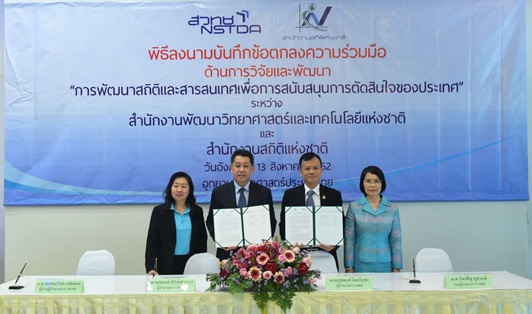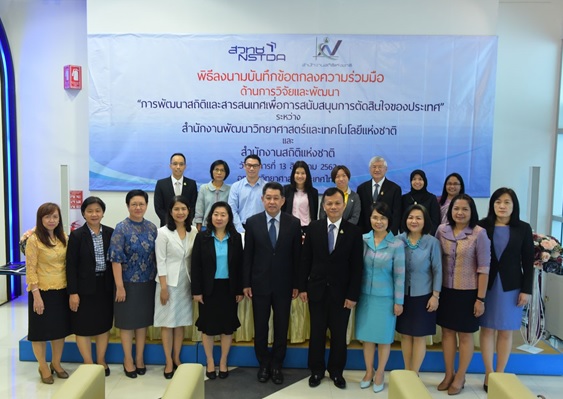NSTDA and the National Statistical Office (NSO) embarks on a collaboration to develop and utilize big data to facilitate decision-making processes by the government. The collaboration will empower the use of statistical data and information in the planning, policy making and progress monitoring in the government departments and agencies and enable better informed decision-making by the government. Leaders of the two organizations – Mr. Putchapong Nodthaisong, NSO Director-General and Dr. Narong Sirilertworakul, NSTDA President – signed an MOU to signify this collaboration on 13 August 2019 at Thailand Science Park.

This MOU provides a framework for two on-going projects – the Establishment of System of Environmental and Economic Accounting for Thailand and the Information Development for the Implementation of the 2030 Agenda for Sustainable Development - and other future initiatives agreed by NSTDA and NSO.
In the first joint project, NSTDA and NSO aims to establish the System of Environmental and Economic Accounting (SEEA) according to the UN framework by integrating data in the National Accounts and the Natural Resources and Environmental Accounts, the latter are data collected by NSTDA over the past 10 years. The project focuses on blue economy in its first phase by setting up Ocean Accounts and utilize the information for the sustainable planning and management of marine resources and maritime tourism.
For the project involving the Information Development for the Implementation of the 2030 Agenda for Sustainable Development, NSTDA will assist NSO – the main agency responsible for developing information system for SDGs in Thailand which contains over 230 indicators – in designing a system to collect baseline data for some indicators such as material footprint (MF: SDG 8.4.1 and SDG 12.2.1), domestic material consumption (DMC: SDG 8.4.2 and SDG 12.2.2) and GHGs per value added (SDG 9.4.1).
These two on-going projects form a good starting point for Thailand to employ big data in the government agencies and facilitate decision-making processes, and thereby advancing Thailand 4.0 policy and its implementation of SDGs.

